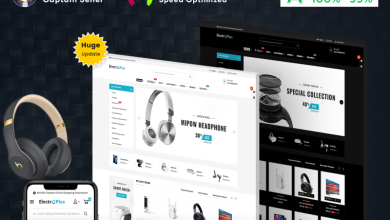Differences Between An Online Store And A Marketplace

An online store vs a marketplace
When it comes to selling products online, the first thing that comes to mind is opening an online store. But there are also many brands and sellers who turn to marketplaces, the larger websites that host thousands of products. How are eCommerce and marketplace selling different?
When publishing your online store, a brand or seller takes over the entire process. Manage product information, customize the website, track inventory and logistics, submit orders, and provide customer service. Give a try to free plugins such as woocommerce stock manager for your online business.
This is a lot of effort, resources, and time. Commercial centers appear to be a simpler method for entering internet business: vendors or brands present their items on the commercial center and may disregard all the other things, as many deals (in exchange for price) warehousing, logistics, shipping, and customer service.
Consequently, in an online business, a brand or retailer has full oversight over its item index, deals processes, brand picture, and client relationships. In the market, you save a lot of procedures, but they are associated with high costs, and the relationship with customers is indirect and cold.
In your online store, you are in control of everything yourself, while in the marketplace you sell your products on a third-party platform, you have to pay certain fees and there are some elements outside of your control, such as customer service or a return policy.
Presently you are confronted with the million-dollar question: is it better to have your own online business or have a wide presence in online business sectors?
What does the current consumer prefer: an online store of one seller or a marketplace market?
The latest thing is that more buyers direct their requests and item correlations straightforwardly to the commercial center than to marked stores. However, the number of online shoppers searching through Google or Yandex is also very high and they are more likely to visit eCommerce directly through an ad, snippet, or prominent link.
This is the primary justification for why such countless unique brands have changed to investing more energy into online commercial centers than their sites or portable applications.
Advantages and disadvantages of an online store
Advantages of an online store
- More control over your platform.
- More customization, both web-style and UX (the type of purchases you suggest to the user: you can decide how the checkout process goes, product notifications, wish lists, etc.).
- The best visual representation of your brand.
- Apply cross-sell and upsell strategies.
- Control of discounts and sales periods.
- Direct and personalized attention to clients.
- Own a list of customers and the availability of their data for marketing campaigns.
- Analysis of behavior (visits, clicks, abandoned carts …).
- More customer loyalty.
Disadvantages of an online store
- More investment of resources and time.
- More costs for software and security certifications.
- You need a team trained to maintain and launch e-commerce platforms and integrate with other channels.
- Control and synchronization of warehouse stocks, distribution network, and shipments.
- More effort to drive traffic to the Internet.
Marketplace advantages
- Easy start.
- The platforms are highly trusted by buyers.
- The ability to stand out in categories from your direct competitors.
- Increased incoming traffic.
- Savings in administrative processes (the marketplace makes transactions and profits for you).
- Dropshipping capability (Marketplace can manage inventory, shipments, and returns on your behalf).
Disadvantages of the marketplace
- Increased competition even with the trading platform’s own products, which will always be given priority).
- Less customization.
- Transaction fees (per listings, product categories, and per sale, vary by market).
- Limited promotions for each seller or times set by the marketplace.
- Lower prices should be noted for competitiveness.
- Customer service is in the hands of the marketplace.
- Lack of control over cross-sells and up-sell offers.
Online stores of the future: a marketplace for specialized goods and services
The most well-known online commercial centers serve customers to rapidly buy items they definitely know how to search for.
But there is another type of shopping that is becoming more and more popular: a quiet search on the Internet with the intention of discovering new products or brands.
This online shopping trend is more common on specialized marketplaces than on conventional marketplaces like AliExpress. These are niche marketplaces that you should pay close attention to if you are looking for platforms for your product catalog.
- These are marketplaces with their own community interested in a product category (handicrafts, furniture, household goods, etc.).
- They provide more options for independent or new brands.
- Some provide access to premium shopper lists that you can contact directly.
- They have a greater flow of users from the marketplace to the web pages of every seller or brand.
- Moreover, they offer more thorough designs and more customization options on your product pages or brand profile.
- They can be international or national, and some of them encourage local trade (for example, they only accept domestic suppliers).
- As a rule, the main five worldwide online platforms are as yet involved by the monster’s Amazon, eBay, Mercado Libre, Rakuten, and AliExpress. But depending on your product niche, a specialized marketplace can guarantee you better exposure and more traffic from regular customers.
So which is better: an online store or a marketplace?
Most online commercial centers unite little and medium-sized brands and organizations, so they are extraordinary stages for producing pay assuming you are simply beginning your deals and hoping to save assets.
However, online shopping is not the best tool for brand advertising. This is because of the buying propensities for clients who use commercial centers to rapidly analyze items, just as the plan of stages where your item pages will be the same as those of your competitors. So it’s hard to stand out and get attention to drive traffic to your own channels.
Do you want to conduct e-commerce and marketplaces at the same time? This is one of the most common solutions: a multi-channel or omnichannel strategy that combines as many in-house sales channels as there are third-party platforms.





